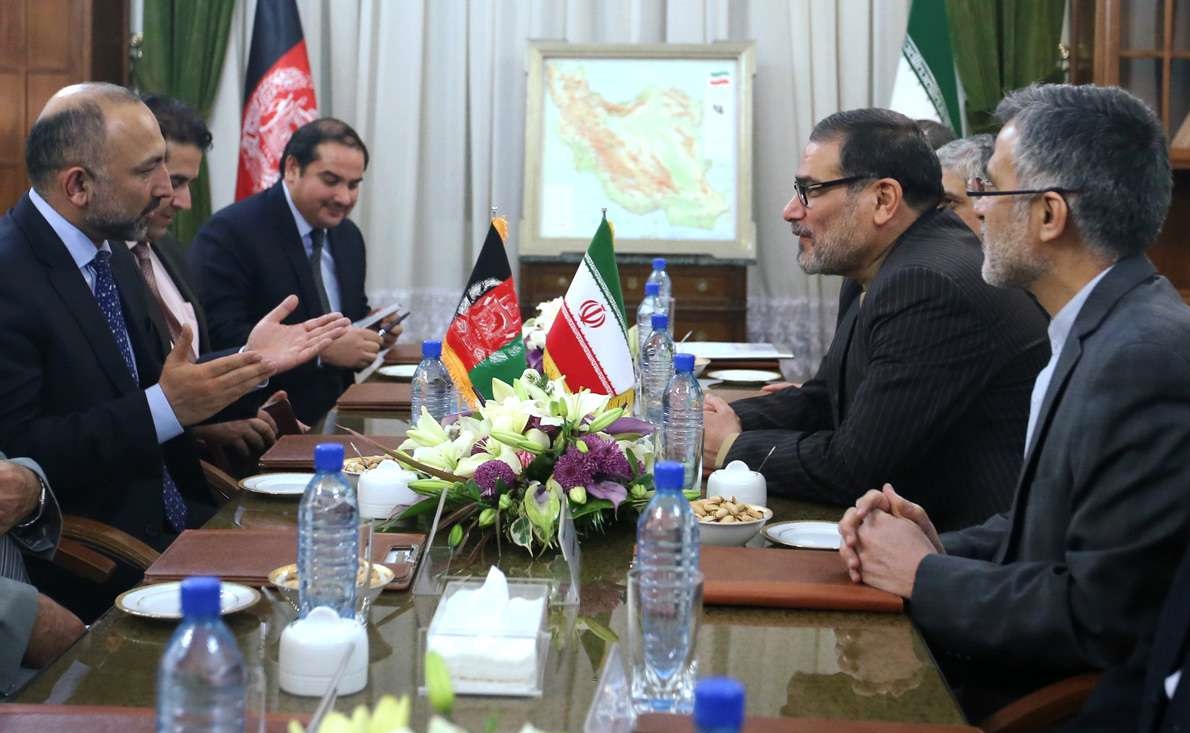Iranian and Afghan security officials met in Tehran on Monday to explore new ways of increasing cooperation, in the face of rising violence and instability across Afghanistan.
During a meeting in the Iranian capital on Monday, the secretary of Iran's Supreme National Security Council Ali Shamkhani and Afghanistan's National Security Advisor Mohammad Hanif Atmar discussed the ways to boost bilateral ties, particularly in the security realm.
Shamkhani said that preventing the emergence and spread of takfiri (unbelievers) terrorist groups requires coherent and coordinated measures by all neighboring countries, and added that "the security of the Islamic Republic is intertwined with and inseparable from that of Afghanistan.” The two countries share a 900 kilometer-long border.
Afghan forces control 59.7 percent of the country but insurgents have increased their offensive across Afghanistan, according to a report issued by the Special Inspector General for Afghanistan Reconstruction (SIGAR) in May.
"Afghanistan remains in the grip of a deadly war," the report says. "Casualties suffered by the Afghan National Defense and Security Forces in the fight against the Taliban and other insurgents continue to be shockingly high."
The threat level by the Taliban across the country’s 407 districts is considered high, and 30 districts are under full Taliban control. The main goal of the Afghan government and its international allies is to send the Taliban into retreat and prevent the re-emergence of Al Qaeda.
Over the past 16 years, Taliban militants have been able to carry out terrorist attacks in various locations throughout the country, killing and displacing civilians, despite American- and NATO-led efforts to establish a sovereign government and security force capable of maintaining peace. Around 25,000 members of the Taliban are reported to be operating in Afghanistan.
But the Taliban is not the only enemy facing coalition forces and Afghan civilians. The Islamic State terrorist group, better known as “ISIS” or abbreviated “IS”, the Islamic Movement of Uzbekistan, the Islamic Jihad Union, and other groups are operating inside Afghanistan and contribute to what is a deteriorating security situation in a war-torn country.
The Islamic State in Khorasan, or ISIS-K, as the Syria-based group’s Afghan wing is known, was founded in 2014 and has about 1,000 fighters across Afghanistan, from a high of 2,500 in 2015. The number of Taliban soldiers and commanders swearing allegiance to ISIS-K is reportedly rising. And intelligence officials believe that ISIS-K is sending new fighters to the battlefield almost as quickly as it loses them.
International troops were sent to Afghanistan under NATO, after the Taliban were ousted in 2001 following the 9/11 attacks in the United States. The number of NATO forces peaked at about 140,000 in 2011, but the figure decreased later as NATO countries handed over control and combat operations to Afghan security forces. NATO’s combat mission in Afghanistan ended in December 2014, leaving a 13,000-strong residual force used for training and counter-terrorism operations, including 9,800 American troops.
But attacks on civilians and security officers have only intensified, and the number of casualties has increased since December 2014. The Afghan National Defense and Security Forces continue its fight against attacks, but are hardly capable of providing security in the face of well-armed rouge groups.
At least 35 people were killed, and 40 wounded when Taliban militants launched a deadly attack on a hospital in Afghanistan’s central Ghor province on July 24. That attack came after the Taliban captured Taywara district in Ghor province, following days of intense fighting with Afghan troops.
Meanwhile, at least 50 Taliban militants were reportedly killed in the Baghlan-e-Markazi district of northern Baghlan province during an ongoing operation by Afghan troops on Tuesday night, according to Afghan media sources.
“The escalation of insecurity and political discord in Afghanistan would spread terrorism and insecurity into other countries in the region” Afghanistan's National Security Advisor Mohammad Hanif Atmar said during Monday’s meeting in Tehran. “Tehran and Kabul must hold more negotiations on ways to strengthen the Afghan government.”







 President Ilham Aliyev shed light on the evolving contours of the peace process with Armenia during an international conference in Baku this week. ...
President Ilham Aliyev shed light on the evolving contours of the peace process with Armenia during an international conference in Baku this week. ...
 Azerbaijan and Armenia started the process of demarcation of their border on Tuesday, with the installation of the first border markers based on ge...
Azerbaijan and Armenia started the process of demarcation of their border on Tuesday, with the installation of the first border markers based on ge...
 Armenian sappers commenced on Monday mine-clearance operations in the territories adjacent to the Saint Mary Church in village of Voskepar (Armenia...
Armenian sappers commenced on Monday mine-clearance operations in the territories adjacent to the Saint Mary Church in village of Voskepar (Armenia...
 As the conflict between Ukraine and Russia escalates, the strategic importance of Kharkiv, Ukraine's second-largest city, has come sharply into focus.
As the conflict between Ukraine and Russia escalates, the strategic importance of Kharkiv, Ukraine's second-largest city, has come sharply into focus.
 President Aliyev emphasized the critical role of the North-South Transport Corridor in fostering transport cooperation between Azerbaijan and Russi...
President Aliyev emphasized the critical role of the North-South Transport Corridor in fostering transport cooperation between Azerbaijan and Russi...



